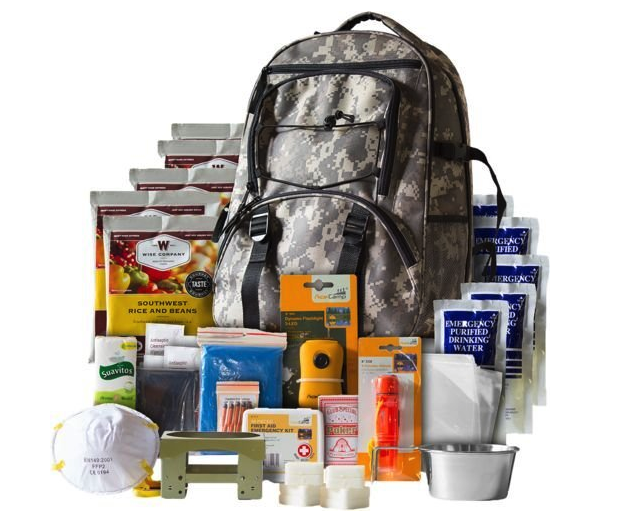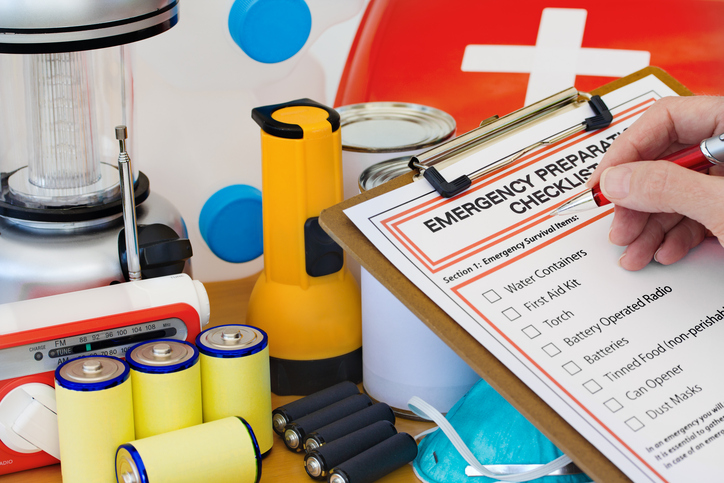Short Answer- How can I prepare my family in case we need to evacuate our home? Plan ahead! Sign up for emergency alerts, make an evacuation plan, prep supplies, and be sure your whole family knows what to do before a real emergency happens.
Mother Nature can be completely unpredictable. That’s why you want to plan ahead to ensure your family is ready in case a natural disaster strikes. Whether it’s a flood, hurricane, tornado, earthquake, tsunami, or wildfire; when the order comes in to evacuate, you want to be ready to get up and GO!
We’re here to help. We talked to some emergency preparedness experts to get the low-down on what you need to do to be prepared.
Our motto, “plan for the best, but be ready for the worst”.
Activate Emergency Alerts
How will I know if we need to evacuate our home? Be sure to get notifications sent to your mobile phone so you are aware when warnings are issued. Take advantage of the free apps available from FEMA or the Red Cross.
In addition, some employers or schools use a service (like LiveSafe) that sends out emergency information to their teams. Check to see if yours does and be sure you have it on your phone.
Know Your Local Risks
Every area is more prone to certain types of disasters than others. Figure out what your highest risks are (depending on where you live) and plan accordingly. Research what items you most need to have on hand for those particular disasters, and what your most important steps are for preparedness.
Also In Beenke: What Do I Need To Know To Prepare For A Natural Disaster?
Facebook Profile
Add your city/state to your Facebook profile. If a disaster happens in the area where you live, the next time you access the site Facebook will automatically let your friends know you are okay.
Evacuation Plan
This is crucial! In the chaos of the moment, family members may head in different directions or exit from different sides of the house. You want to be sure everyone is out and accounted for!
The best way to do this is to create a plan and practice it with everyone, especially your kids. Designate a meeting spot where everyone will assemble once outside.
Assign someone to grab your “go bag” full of necessary supplies and be sure to keep it in a location where it’s easy to reach. Someone should also be responsible for loading your go-box into the car if you have more time.
Figure out a plan for anyone that might need help getting out of the house (infants, small children, elderly or disabled family members) and be sure someone is assigned to assist.
Also consider that your normal exit may be blocked, so build alternate routes into your escape plan. For example, if flood waters are rising, you may need to have a way to access the roof. Or if a fire is threatening the front entrance, you should have a way to escape out the back.
Click here for a printable family-plan template.

Document Important Info
Prepare for potential power outages by saving data on a zip drive or writing down important information the old-fashioned way. You want to be ready in case you can’t charge your cell phone or grab all your original paperwork.
Put the paper or zip drive in a waterproof sealed plastic baggie inside your go-bag to be sure it survives whatever crazy weather may be heading your way.
- List of personal contacts
- Driver’s license
- Will or trust
- Insurance information
- Medical records
- Social security cards
- Passports
- Birth certificates
- Kids’ immunization records
- Pets’ microchip information
Prep Your Go-Bags
Evacuations can happen fast! You want to have your go-bags set up ahead of time so you’re ready to leave at a moment’s notice. There are two ways an evacuation can play out.
Fast and furious, where you have only minutes to escape. You might even have to leave on foot if access to roads or cars is blocked.
Or, it could be a warning situation where you’re notified hours in advance and have a little more time to pack up and leave. Either way, you want to be have the right stuff prepared so you’re ready to go.
Everybody’s supply list will be different, depending on where you live, what you’re prepping for, and how big your family is… but here’s a few basics everyone needs in their go-bag to get you started.

Fast Go-Bag (Backpack)
You want to pack an emergency backpack or nylon camper’s bad with a drawstring that you can grab in a hurry and carry with you if you’re leaving on foot. You may need to pack several backpacks, depending on the size of your family.
Be sure everyone knows which bag they are responsible for and keep it in a consistent, easy to grab location at all times. Also, keep a pair of sturdy, comfortable shoes near your bed so you can put them on quickly.
- Your waterproof zip lock baggie containing copies of your important information either written down or on a zip drive
- Battery powered radio (to hear emergency broadcasts)
- Extra batteries
- First-Aid Kit
- Flashlights
- Candles and matches
- Prescription medication (if a family member relies on meds, be sure to pack some so they don’t go without)
- Thermal blanket
- Lightweight non-perishable food (like bars or MREs)
- A bottle of water and/or a water filter
- Cash
- Diapers (if applicable)
- Pet food and leash (if applicable)
- A map marked with at least two evacuation routes out of the area
Car Go-Box
For situations where you have more time to leave, you also want to prepare a car go-box that contains additional supplies. A tub or chest with wheels works great for this! Wheels will make it easier to transport. You also want to be sure the box isn’t too heavy to lift, or too large to fit in the back of your car.
Keep your go-box in an easily accessible, consistent location and be sure all family members know where it’s at. If you have to evacuate, after you grab your backpacks, someone should be responsible for getting the go-box and putting it in the car. These items are in addition to what you have packed in your go-bag.
- 3-gallons of water per family member
- 3 day supply of non-perishable food
- Change of clothing for each family member (warm sweats or loose comfortable clothes are a good choice)
- Extra set of car keys, cash, and credit cards
- Extra eye glasses or contacts
- Feminine hygiene products
- Extra pet food (if applicable)
- Extra chargers for phone/laptop
- Laptop and hard drives
- Family photos or other irreplaceable items
- Jewelry and other small valuables
Be sure you check on your go-bag and go-box every six months and replace any supplies; like food, water, or medicine, that may have gone out of date. You don’t want to be faced with an evacuation and a bag of spoiled food.
Pre-Evacuation Checklist
If you’re anticipating an evacuation, or you’ve been notified but still have some time, complete these steps to help keep your home safe.
- Shut off the gas near the meter
- Shut off the air conditioning
- If it’s a fire situation, remove flammable window shades and push flammable furniture to the center of the room
- Turn off propane tanks
- Don’t leave any water or sprinklers running
- Close all windows and doors
- Check on your neighbors to be sure they are preparing to leave
- Gather all pets and load them in the car when it’s time to go
- Arrange transportation for farm animals if time allows
Here’s some other cool preparedness gadgets you might want to consider:
LifeStraw – A personal water filter that removes parasites and bacteria from up to 264 gallons of water.
Solar Charger (Goal Zero) – A small solar panel that when charged (in about three hours) powers up batteries or allows you to plug in items like a phone with its USB port.
Now that we’ve answered the question, how do I prepare to evacuate our home? It’s time to start prepping. Make a plan, get your go-bag together and practice with the whole family. You’ll have the peace of mind knowing you’re ready.
Also In Beenke:
Are your friends prepared for an evacuation? Share this article on Facebook and Pinterest by clicking the buttons below.












